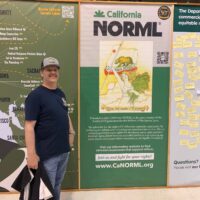Dear Friends:
California NORML is proud to have been on the forefront of marijuana reform in 2009, a year that marked a memorable turning point in the movement as legalization finally emerged as a serious political issue. Your support for CalNORML will help us move this issue forward as never before.
CalNORML is particularly proud to have proposed the first-ever bill to legalize marijuana in California, Tom Ammiano’s bill AB 390. Many thanks are due to former State Senator John Vasconcellos, who prepared the original draft of the bill and passed it on to us, and to Assemblyman Ammiano for having the vision to sponsor it. AB 390 has generated unprecedented public attention, overwhelmingly favorable, to the merits of adult use legalization, with media coverage from CNN, Newsweek, the Economist and the Washington Post.
NORML discovered a remarkable surge in support for legalization last winter in a Zogby poll question that we sponsored, which found that an unprecedented majority of voters in Western States supported legalizing, taxing and regulating marijuana. The shift in public mood coincided with the advent of a new administration and a severe economic downturn militating for a re-evaluation of public priorities.
California NORML focused on these concerns with an economic analysis of the Ammiano bill. We estimated that its proposed $50/ounce excise tax on non-medical sales would yield the state some $1.2 billion in revenues. Our estimate was subsequently confirmed by the state Board of Equalization, which raised the number to $1.4 billion. Oakland voters picked up on this message by approving the first-ever city tax on cannabis businesses, Measure K, by 80%.
Our economic analysis proved to be an especially powerful argument in light of the recession and the state’s budget crisis. In April, a California Field poll reported that 56% of voters favored legalizing and taxing marijuana to help solve the budget problem. Asked about the issue, Gov. Schwarzenegger proclaimed “It’s time for a debate,” though he carefully distanced himself from AB 390. California NORML has been running ads to publicize the Governor’s statement and invite everyone to join the debate.
In October, the Assembly Public Safety Committee held landmark hearings on marijuana legalization, where California NORML director Dale Gieringer testified that the state would do better not to treat marijuana users as criminals, but as tax-paying citizens. The Assembly will hold final hearings on Ammiano’s bill in early January. Please tell your legislators to support AB 390 via phone, FAX or our website www.canorml.org
In the meantime, the surge in public interest in legalization sparked four different ballot initiative proposals. One of them, the Tax and Regulate 2010 initiative (www.taxandregulate2010.org), has already collected sufficient signatures to be assured of a place on next November’s ballot, assuring that 2010 will be an exciting year.
CONFERENCE AND CHAPTER NEWS
National NORML held its annual conference in San Francisco this year, the best-attended conference ever. Many thanks to the generous sponsors who made the conference possible. Featured guests included Assemblyman Tom Ammiano and Tax and Regulate 2010 initiative sponsor Richard Lee of Oaksterdam University, who staged a press conference to announce the kick-off of his petition campaign. Next year’s NORML conference will be held in Portland, Oregon. We are considering holding a CalNORML conference in 2010.
Spurred by the wave of enthusiasm, new local NORML chapters opened around the state this year:
– Southern California NORML, serving San Diego and the High Desert;
– High Sierra NORML, serving the Butte County area;
– San Luis Obispo (SLO) NORML;
– Beverly Hills NORML;
– a campus chapter at CSU Monterey Bay.
Other chapter applications are pending.
FEDERAL ROADBLOCKS AND STATE ACTIONS
At the federal level, the most significant development was Attorney General Eric Holder’s announcement that the Obama Administration will not push to prosecute medical marijuana offenders who are compliant with state law. The result was to stimulate a blossoming of new dispensaries in previously underserved areas, among them Redding, San Jose, Chico, San Diego, Richmond, Redwood City, Orange and Riverside counties, as well as the states of Colorado, Montana and Washington.
Otherwise, there has been remarkably little progress at the federal level. The administration has neglected to appoint a new DEA chief or new U.S. attorneys in California. A seven-year-old rescheduling petition to reschedule marijuana for medical use, which is co-sponsored by California NORML, continues to languish in the Department of Health and Human Services. Not a single federal law or regulation regarding marijuana has been changed. In Congress, NORML continues to support a pair of bills by Rep. Barney Frank: HR 2943, which would completely eliminate federal penalties for possession of 100 grams or less, and HR 2835, which would authorize states to regulate medical marijuana as they see fit. However, Congressional leaders have made it clear that they will not entertain any hearings on marijuana legislation this session.
LOCAL CHAPTERS FIGHT MEDICAL MJ BANS
In the meantime, the leading local issue facing NORML supporters in California has been city and county efforts to restrict, regulate, or ban medical marijuana collectives and dispensaries.
Major battlegrounds include:
– Los Angeles, where LA NORML successfully helped to protect patient privacy and scuttle efforts by City Attorney Carmen Trutanich to ban medical marijuana sales;
– San Diego, where activists are calling for legally regulated dispensaries and opposing efforts by district attorney Bonnie Dumanis to prosecute dozens of medical marijuana providers;
– Orange County, where OC NORML has been opposing dispensary crackdowns in Lake Forest and Dana Point;
– Shasta and Tehama Counties, where NORML supporters are fighting bans in Redding, Red Bluff, and elsewhere;
– Lake County, where CalNORML is working to propose sensible alternatives to proposed bans in Clearlake;
– Riverside County, where patient advocates cheered the dismissal of cultivation charges against a home collective gardener, Martin Victor; and
– Mendocino County, where a measure to license collective gardens is on the table and CalNORML has been consulting with activists and public officials.
In Red Bluff, a call from CalNORML attorney Bill Panzer was enough to convince the city attorney to strip out a provision disallowing cultivation of any kind. In Napa, CalNORML helped organize proponents to beat back a dispensary ban.
In Los Angeles, a CalNORML press release titled “Ill-Conceived L.A. Medical Marijuana Proposal Would Cost $36 – $74 Million In Tax Revenues” received much press attention and put opponents of legal sales on the defensive.
With our network of member activists throughout the state, CalNORML is able to generate citizen action on statewide issues, as well as local and national ones. We maintain email alert lists for cannabis collectives, attorneys, physicians, and northern and southern California activists.
Backed up by sound research and reasoned analysis, we have been the source and the hub of marijuana reform efforts since 1972. Our website, www.canorml.org, receives over 1,000 visits daily, and we respond to dozens of daily inquiries on the site and by phone, from Californians seeking information about the laws and wanting to get involved in reform.
CalNORML is nationally recognized as a source of reliable information on marijuana policy questions. We have been quoted as a source for leading publications including the Wall Street Journal, Christian Science Monitor, San Francisco Chronicle, Contra Costa Times, Eureka Times-Standard, San Diego Union Tribune, San Jose Mercury and Congressional Quarterly.
In 2009, California NORML also:
– Tracked and sent out alerts about DEA raids on collectives, challenging the Obama administration to keep to its policy of respecting state medical marijuana laws;
– Called attention to the fact that the Governor’s prison reform bill had no provision to release marijuana offenders with our press release, “Governor’s Prison Plan: Don’t Tax Pot, Steal a Car”;
– Publicized the plight of pain patients who were being denied their prescription medications because of medical marijuana use due to abusive drug testing;
– Having testified at the Cal EPA hearings on the carcinogenicity of marijuana smoke, responded to the story when the news broke, making the important distinction between laboratory tests and actual human clinical experience with marijuana; and
– Donated our historical archives on the marijuana reform movement to the Bancroft Library at the University of California Berkeley, the state’s premier research library on California history, so as to establish the first publicly accessible documentation on the origins of the marijuana reform movement in California, the California Marijuana Initiative of 1972, and the Moscone Decriminalization Act.
We have made amazing progress this year, yet much remains to be done. Please support California NORML’s ongoing efforts to advance your right to use marijuana! Order one of our authoritative books, or our original T-shirts or hats. Donate or renew your membership by visiting us online with AlertPay at https://www.canorml.org/.



